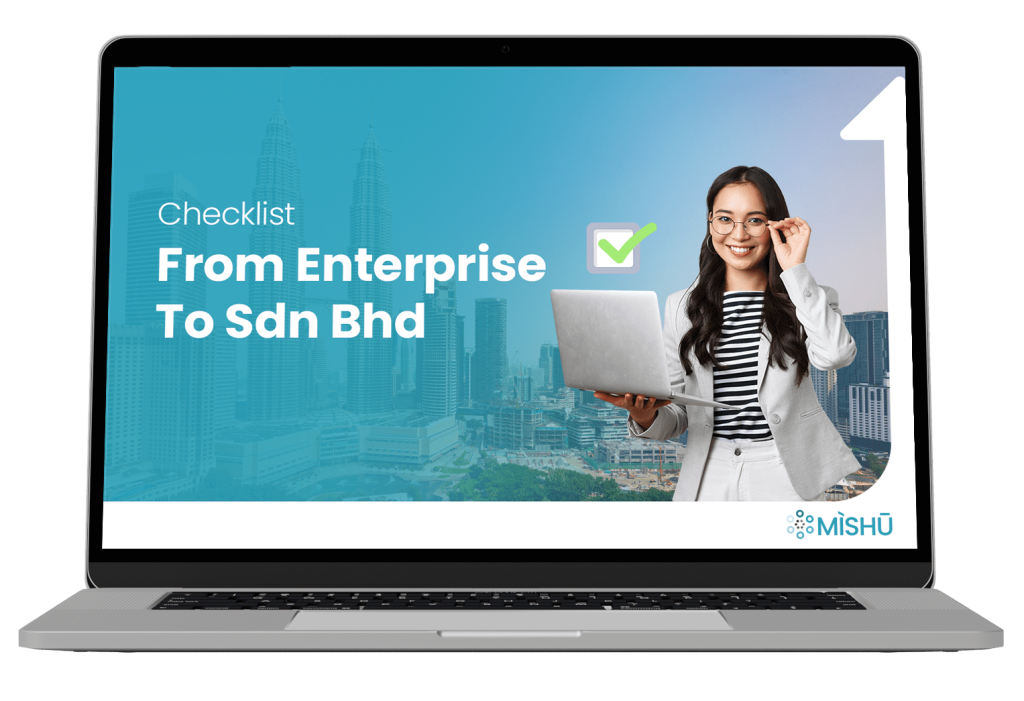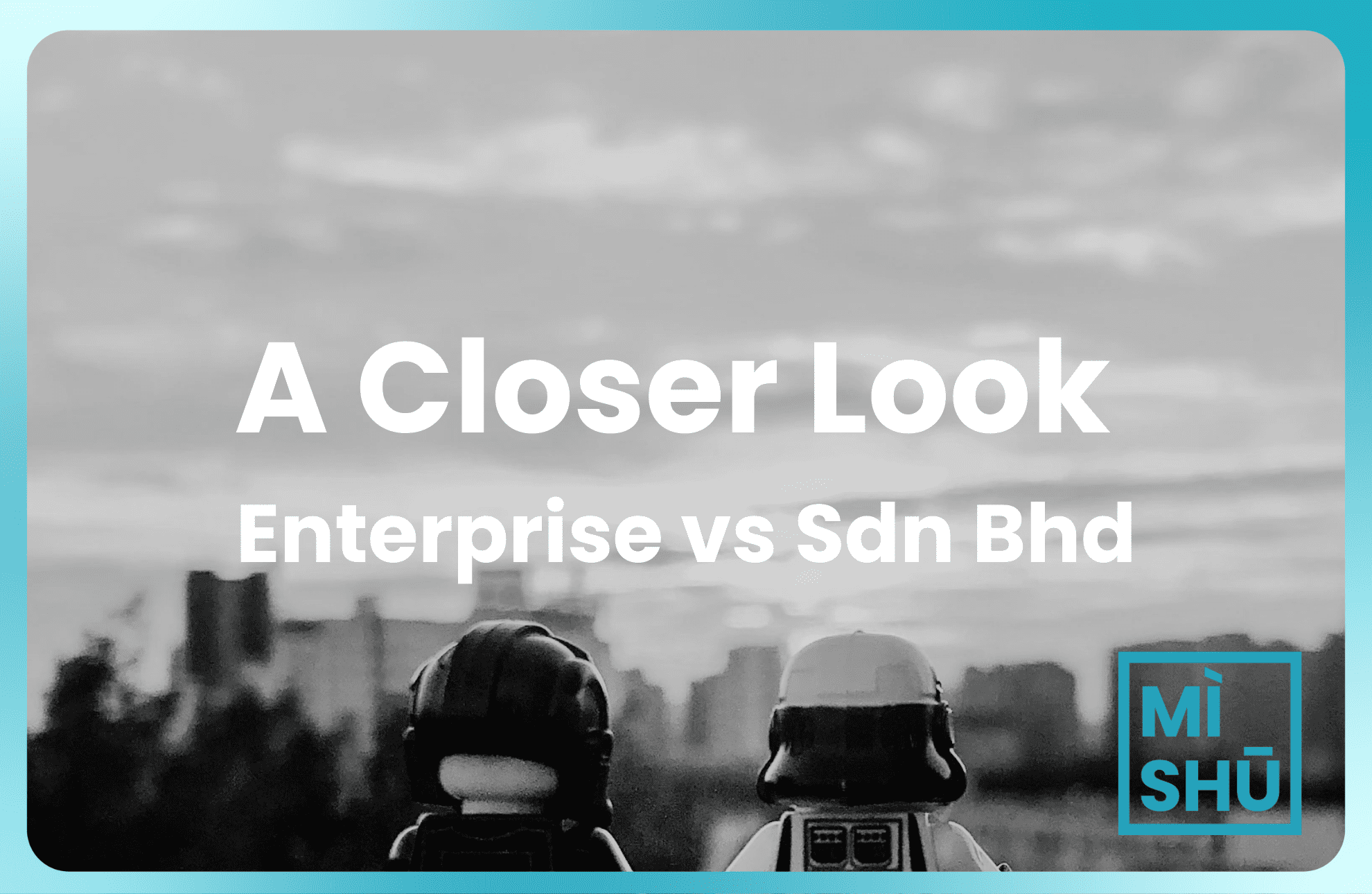An Enterprises and Sdn Bhds couldn’t be more different from each other, it’s actually not that hard to choose which of the two best aligns with your business goals.

This post provides a comprehensive guide to the differences between an Enterprise and Sdn Bhd in Malaysia, allowing entrepreneurs to choose the most ideal business structure for their needs.
Let’s begin.
Overview of Enterprise vs Sdn Bhd
Enterprises and Sdn Bhds are near polar opposites in terms of financial, administrative, and tax demands, as illustrated by the table below.
| Criteria | Enterprise | Sdn Bhd |
|---|---|---|
| Foreigners | Not allowed | Allowed (subject to sector) |
| Formation costs | ~ RM30 – 60 without third-party assistance. | ~ RM4,000 for typical incorporation; custom setup can increase costs. |
| Annual maintenance | Less | Higher |
| Liability protection | None. Owner is fully liable for the decisions of the company | Limited. Shareholders and directors are protected from company liabilities |
| Administration structure | Simpler | More complicated. Mandatory appointments and changes in company details must be reported to SSM. |
| Tax on income | Subjected to personal income tax as high as 30%. | Corporate income tax rate on company profits at 15-24%. |
| Tax on owners | Bundled with company revenue. | No tax on dividends received and certain rules for tax deductions. |
| Ease of growth | Harder to secure loans / grants. Cannot raise funds via share sales. | Easier to obtain loans / grants. Can raise funds through sales of shares, especially if public. |
In summary:
- It’s significantly more expensive to incorporate and maintain a Sdn Bhd
- Sdn Bhd’s are subject to stricter record keeping and compliance requirements
- Sdn Bhd owners are protected from company debt while an Entperprise owner is fully liable for any debt incurred by the business.
- At higher annual revenue (around RM70,000), Sdn Bhds pay less tax than Enterprises.
- It’s much easier for Sdn Bhds to grow via business loans and selling company shares.
Let’s take a closer look at the key differences.
1. Sdn Bhds have stricter statutory compliance
The Companies Act 2016 requires all Sdn Bhds to submit Annual Returns which consist of Annual Returns and Audited Financial Statements.
| Type of Document | Explanation | Deadline |
|---|---|---|
| Annual Returns | Company details such as business activities, location, office, share structure, as well as stakeholder details. | Within 30 days from the anniversary of incorporation. |
| Audited Financial Statements | Key company finances including balance sheets, cash flow statement, and income statements. | Within 30 days of being circulated to shareholders. |
The Annual Returns are filed by the Sdn Bhd’s Company Secretary, and the financial statements must be signed off by an external auditor.
Meanwhile, an Enterprise owner only needs to visit SSM’s online portal to renew their business registration before the registration expiry date and up to 12 months past the registration expiration.
2. Sdn Bhds provides limited liability
A Sdn Bhd is treated as a separate legal entity, while Enterprise and owner are considered a single entity.

This grants owners of a Sdn Bhd limited liability, which means their personal assets are separate from the business and therefore protected from company debts. As a shareholder, you are only at risk of losing as much as you have invested into the company.
Meanwhile, owners of an Enterprise are subject to unlimited liability where the business’ assests are treated as the owner’s personal asset, and if the business incurs debts, your personal assets can be used to settle them.
3. Sdn Bhds enjoy corporate income tax rates
Taxation is a major consideration for business owners, and we hope this section demonstrates just how much tax savings Sdn Bhds enjoy from corporate income tax rates at higher annual revenue levels.
The magic number: RM70,000 in annual profits
Beyond RM70,000 in annual profit, the tax benefits of a Sdn Bhd structure begin to outweigh higher upkeep costs as it remains constant at 15% up to RM150,000. Meanwhile, an Enterprise earning RM150,000 is well into the 25% personal income tax bracket.

Assuming both an Enterprise and Sdn Bhd earned RM150,000 in YA 2023:
- the Enterprise would owe RM31,400
- The Sdn Bhd would only owe RM22,500
That’s a significant amount of tax saved, and as revenue increases, the difference only becomes more extreme. For a more in depth guide to how this is calculated, check out our sole proprietor’s guide to income tax.
When to choose a Sdn Bhd
As the structure with the higher barrier to entry but significantly more room for growth, a Sdn Bhd is superior if:
- You prioritise legally protecting personal assets from business-related liabilities.
- You would like to pursue long-term expansion and high revenue.
- You plan to secure financial support from investors who require a clear management structure and limited personal liability.
- The business will be co-owned by multiple shareholders and requires a clear decision-making process.
- You want to offer stock options to attract high-performing employees.
If that sounds like you, check out our guide to company incorporation in Malaysia.
When to choose an Enterprise
As the structure with a lower barrier to entry but less room for growth, an Enterprise is suitable if:
- You’re a solo entrepreneur starting out with a small management team.
- You plan to keep your business operations simple and localised.
- You prefer minimal legal requirements, less paperwork, and a quicker set up.
- You have no plans or need to raise funding from public investors.
- You’re comfortable being personally liable for business risks.
If an Enterprise is all you need, we can help you register with SSM.
Going from Enterprise to Sdn Bhd
You can always start small with an Enterprise, then as you establish proof of concept and your revenue grows, convert it into a Sdn Bhd.
Download our ten item checklist so you’ll know the time is right to make the transition.

It’s less strightforward, but far less risky for new entrepreneurs, and when you’re new, being risk-averse is not a bad thing at all.
Let MISHU help set up your business

Regardless of business structure, you’ll still need a great business consultant who understands Malaysian SME pain points! The MISHU team is here to help you start, build, and grow your business into its full potential.
